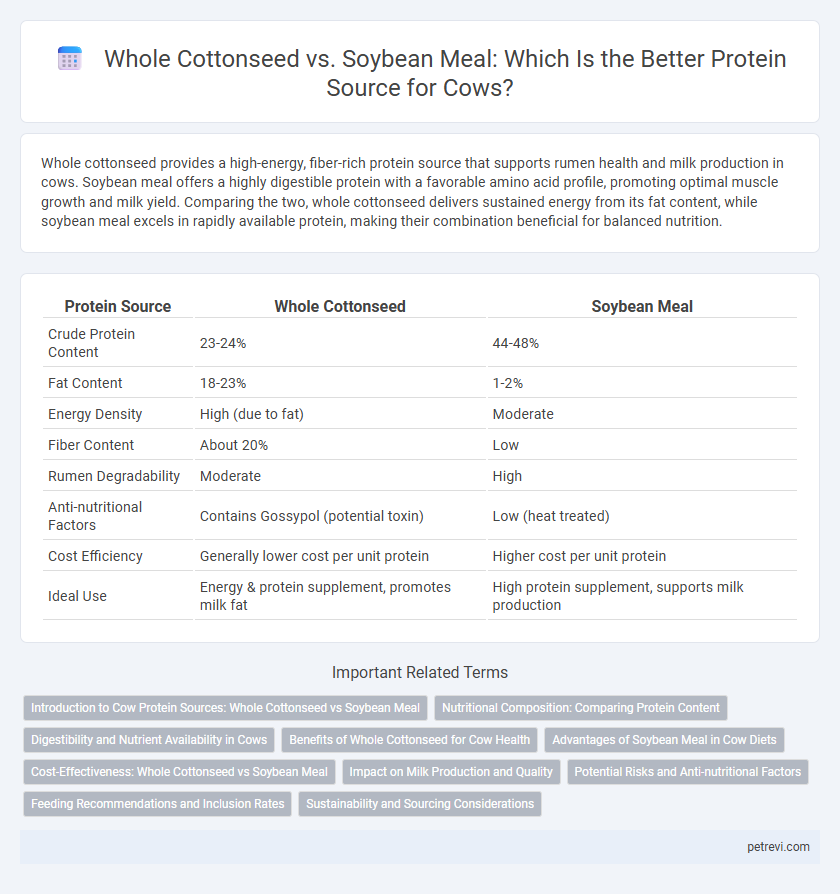Whole cottonseed provides a high-energy, fiber-rich protein source that supports rumen health and milk production in cows. Soybean meal offers a highly digestible protein with a favorable amino acid profile, promoting optimal muscle growth and milk yield. Comparing the two, whole cottonseed delivers sustained energy from its fat content, while soybean meal excels in rapidly available protein, making their combination beneficial for balanced nutrition.
Table of Comparison
| Protein Source | Whole Cottonseed | Soybean Meal |
|---|---|---|
| Crude Protein Content | 23-24% | 44-48% |
| Fat Content | 18-23% | 1-2% |
| Energy Density | High (due to fat) | Moderate |
| Fiber Content | About 20% | Low |
| Rumen Degradability | Moderate | High |
| Anti-nutritional Factors | Contains Gossypol (potential toxin) | Low (heat treated) |
| Cost Efficiency | Generally lower cost per unit protein | Higher cost per unit protein |
| Ideal Use | Energy & protein supplement, promotes milk fat | High protein supplement, supports milk production |
Introduction to Cow Protein Sources: Whole Cottonseed vs Soybean Meal
Whole cottonseed and soybean meal are two primary protein sources in dairy cow nutrition, each offering distinct nutrient profiles essential for milk production and overall health. Whole cottonseed provides a high-fat content alongside digestible fiber, supporting energy intake and rumen function, whereas soybean meal is renowned for its high-quality, highly digestible protein that enhances microbial protein synthesis in the rumen. Selecting the appropriate protein source depends on balancing energy, fiber, and protein requirements to optimize milk yield and cow health.
Nutritional Composition: Comparing Protein Content
Whole cottonseed contains approximately 23-25% crude protein, offering a rich source of rumen undegradable protein that benefits lactating cows by enhancing milk production. Soybean meal typically provides a higher crude protein content, ranging from 44-48%, and is highly digestible, supplying essential amino acids crucial for growth and milk synthesis. The choice between whole cottonseed and soybean meal depends on balancing protein levels with energy content and fiber, as whole cottonseed also contributes fat and fiber, supporting overall rumen health.
Digestibility and Nutrient Availability in Cows
Whole cottonseed offers higher fiber digestibility and energy content compared to soybean meal, enhancing rumen fermentation and milk fat synthesis in cows. Soybean meal provides a more concentrated source of rumen-degradable protein, promoting microbial protein synthesis essential for optimal cow growth and milk production. Digestibility studies highlight that combining whole cottonseed with soybean meal optimizes nutrient availability, balancing energy and protein supply for improved dairy cow performance.
Benefits of Whole Cottonseed for Cow Health
Whole cottonseed provides a highly digestible fiber and fat source that enhances energy intake and supports rumen health in dairy cows. Its natural balance of protein, fat, and fiber improves milk yield and components while promoting optimal microbial protein synthesis. Compared to soybean meal, whole cottonseed contributes to better overall cow health by reducing the risk of acidosis and improving metabolic efficiency.
Advantages of Soybean Meal in Cow Diets
Soybean meal provides a highly digestible protein source with a balanced amino acid profile, promoting improved milk production and growth rates in dairy and beef cattle. Its high protein concentration and low fiber content enhance nutrient absorption and feed efficiency compared to whole cottonseed. Incorporating soybean meal into cow diets supports optimal rumen function and boosts overall animal health.
Cost-Effectiveness: Whole Cottonseed vs Soybean Meal
Whole cottonseed offers a more cost-effective protein source for cows compared to soybean meal due to its dual role as both an energy and protein supplement, reducing the need for additional feed components. The high fiber content and fat levels in whole cottonseed support rumen function and milk production efficiency, often resulting in lower overall feed costs. Conversely, soybean meal, while rich in digestible protein, typically incurs higher prices and lacks the energy density found in whole cottonseed, impacting total feeding expenses.
Impact on Milk Production and Quality
Whole cottonseed provides a high-energy, fiber-rich protein source that enhances milk fat content and overall yield in dairy cows compared to soybean meal, which primarily boosts milk protein concentration. The inclusion of whole cottonseed benefits rumen function and increases energy density, supporting improved milk volume and quality parameters. Soybean meal, while effective in supplying rumen degradable protein, may not contribute as significantly to milk fat synthesis as whole cottonseed.
Potential Risks and Anti-nutritional Factors
Whole cottonseed contains gossypol, a toxic polyphenolic compound that can pose health risks such as reduced fertility and liver damage in cows when consumed in excessive amounts. Soybean meal, while high in protein, contains trypsin inhibitors and lectins that impair protein digestion and may cause gastrointestinal upset if not properly processed. Both feed sources require cautious use and appropriate processing to mitigate anti-nutritional factors and ensure safe, effective protein supplementation in dairy and beef cattle diets.
Feeding Recommendations and Inclusion Rates
Whole cottonseed offers a high-fat, fiber-rich protein source for dairy cows, recommended at inclusion rates of 8-10% of the total dry matter intake to optimize energy and rumen function. Soybean meal, with its highly digestible protein, is typically included at 15-20% of the ration to meet cows' amino acid requirements and maximize milk production. Balancing whole cottonseed and soybean meal ensures adequate protein supply while supporting rumen health and overall lactation performance.
Sustainability and Sourcing Considerations
Whole cottonseed offers a sustainable protein source for cows due to its dual function as both energy and protein provider, often sourced from byproducts of cotton farming that reduce waste. Soybean meal, while widely used for its high protein content and digestibility, raises sustainability concerns related to deforestation and intensive land use in major producing regions like Brazil and the U.S. Evaluating sourcing impacts, whole cottonseed leverages agricultural residues with lower carbon footprints, whereas soybean meal requires careful supply chain management to avoid environmental degradation and support responsible farming practices.
Whole Cottonseed vs Soybean Meal for Cow Protein Source Infographic

 petrevi.com
petrevi.com